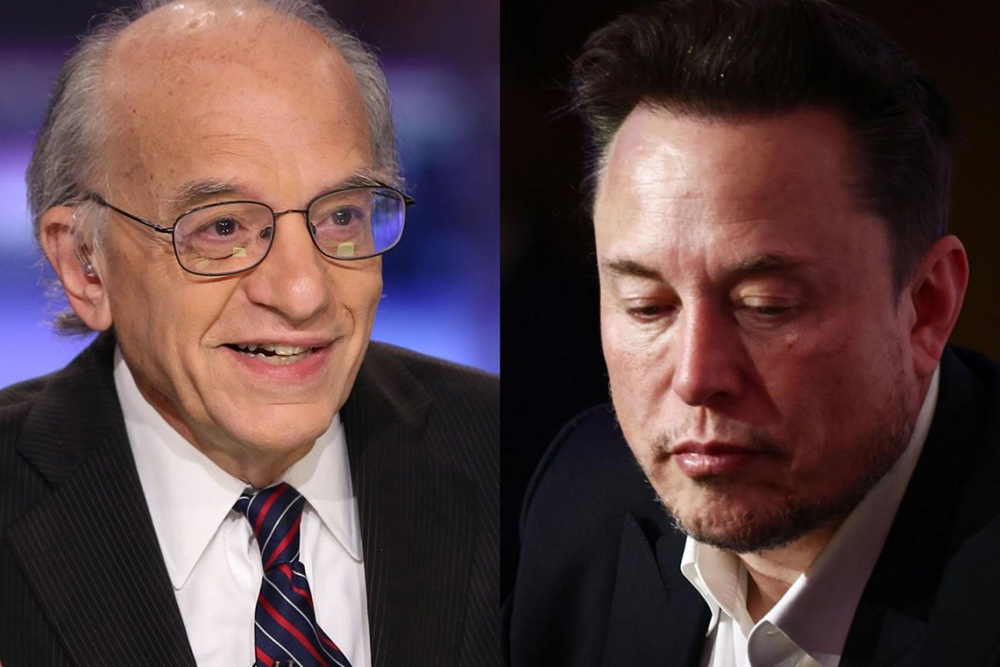
沃頓商學院(Wharton)的傳奇教授杰里米·西格爾認為,,越來越多的人質(zhì)疑特斯拉(Tesla)在華爾街最熱門的股票選擇(即所謂的“美股七雄”)中的地位,這對經(jīng)濟是有益的,。
在過去一年左右的時間里,,特斯拉遭遇了困境。今年1月,,該電動汽車廠商被中國競爭對手比亞迪超越,,失去了全球最大汽車廠商的頭銜。
但埃隆·馬斯克不僅要面對窮追不舍的競爭對手,,還被股東們指責他沒有制定重回領(lǐng)先地位的計劃,。
在經(jīng)過一系列反響平平的業(yè)績電話會議之后,再加上媒體爆料的馬斯克服用氯胺酮處方藥的消息,,難怪分析師們會想要把不按照常理出牌的特斯拉與芯片廠商英偉達(Nvidia)等暴漲的股票區(qū)分開來,。
賓夕法尼亞大學(University of Pennsylvania)沃頓商學院(Wharton School)的金融專業(yè)榮譽教授和交易所交易基金WisdomTree的高級經(jīng)濟學家西格爾教授認為,這是好事,。
西格爾教授在為該專業(yè)投資公司所寫的每周評論中寫道:“有更多的人在討論美股六雄,,而不是七雄,這凸顯出特斯拉在過去九個月左右的業(yè)績不盡如人意,?!?/p>
特斯拉是否還屬于美股七雄?
美股七雄(Magnificent 7)是指支撐標準普爾500指數(shù)(S&P 500)的大盤股票:Alphabet,、亞馬遜(Amazon),、蘋果(Apple)、Meta Platforms,、微軟(Microsoft),、英偉達和特斯拉。
2023年11月,,摩根大通(JPMorgan),、高盛集團(Goldman Sachs)和奧本海默(Oppenheimer)等公司的分析師對《財富》雜志表示,他們看好美股七雄的整體業(yè)績,。
西格爾教授認為,,特斯拉與美股七雄的其他股票區(qū)分開來是好事。他解釋道:“這是市場健康的標志,;美股七雄并不是被作為一個整體,,而且我們將特斯拉與其他公司區(qū)分開來是基于不同的營收預測,。”
上周末,,高盛集團的分析師就選擇了這樣做:根據(jù)產(chǎn)量情況和市場風險,,下調(diào)了對特斯拉的預估。
《財富》雜志看到的股票研究人員馬克·德萊尼,、威爾·布萊恩特,、摩根·梁和阿曼·古普塔的一份報告里寫道:“雖然鑒于特斯拉在電動汽車和清潔能源市場的優(yōu)勢地位(我們將其歸功于它有能力提供完整的解決方案,包括充電,、儲能,、軟件/完全自動駕駛軟件和服務(wù)等,而且它具有領(lǐng)先的成本結(jié)構(gòu)),,我們?nèi)匀幌嘈盘厮估锌赡軐崿F(xiàn)長期增長,,但我們認為,短期內(nèi)電動汽車市場狀況持續(xù)疲軟,,將影響特斯拉的營收,。”
因此,,這四位作者把樂觀情景下特斯拉的12個月股價目標,,從之前的220美元下調(diào)為190美元,并預計12個月至24個月的股價目標約為300美元,。他們表示,,在悲觀情境下的股價目標可能為65美元至85美元。
高盛集團在一篇報告中同樣下調(diào)了特斯拉的交付量預估:高盛集團將2025年/2026年的汽車交付量預測,,從之前的253萬輛至300萬輛,,下調(diào)至235萬輛至275萬輛。
在高盛集團調(diào)整預測之前,,富國銀行(Wells Fargo)的分析師科林·蘭甘直接下調(diào)了對特斯拉股票的評級,。
他在3月13日的一篇客戶報告里寫道,他實際上把特斯拉的股票下調(diào)至相當于賣出評級,。蘭甘預測,,特斯拉今年的銷量將維持平穩(wěn),到2025年會開始下滑,。
蘭甘補充道,,馬斯克的公司是一家“沒有增長的成長型公司”,他強調(diào)稱,,2023年下半年特斯拉汽車銷量比上半年僅增長了3%,,但價格下降了5%。
高股票估值
如果僅從表面上來看,華爾街開始區(qū)分特斯拉和美股七雄中的其他股票,,這或許能夠在一定程度上讓對大盤估值悲觀的市場看空者感到安心,。
例如,上個月,,華爾街的傳奇投資者約翰·胡斯曼表示,,他會“專注于自己熟悉的領(lǐng)域”,避免參與瘋狂的,、因為“錯失焦慮癥”(FOMO)而進行的交易,。
作為胡斯曼投資信托(Hussman Investment Trust)的總裁,胡斯曼認為市場已經(jīng)達到最高點,,現(xiàn)在將進入回報“低迷的”十年,。
他指出:“我們無法預知未來,,但我們可以回顧歷史,,進行一些數(shù)學計算。目前的市場狀況與歷史市場高點存在更強的正相關(guān)性,,與歷史市場低點存在更強的負相關(guān)性,,超過了歷史上99.9%的情況?!?/p>
雖然美股七雄在一天內(nèi)經(jīng)歷大幅漲跌的情況并不陌生,,特斯拉更是首當其沖,但這家電動汽車廠商可能不再像過去那樣,,依舊是“錯失焦慮癥”交易商們關(guān)注的焦點,。
雖然備受期待的Cybertruck的發(fā)布和面向大眾市場的電動汽車在明年開始生產(chǎn)的消息,令投資者歡欣鼓舞,,但它所做的不足以阻止公司股價下跌,。
今年迄今為止,特斯拉的股價下跌了近31%,,2023年下跌了6%,。(財富中文網(wǎng))
譯者:劉進龍
審校:汪皓
沃頓商學院(Wharton)的傳奇教授杰里米·西格爾認為,越來越多的人質(zhì)疑特斯拉(Tesla)在華爾街最熱門的股票選擇(即所謂的“美股七雄”)中的地位,,這對經(jīng)濟是有益的,。
在過去一年左右的時間里,特斯拉遭遇了困境,。今年1月,,該電動汽車廠商被中國競爭對手比亞迪超越,失去了全球最大汽車廠商的頭銜,。
但埃隆·馬斯克不僅要面對窮追不舍的競爭對手,,還被股東們指責他沒有制定重回領(lǐng)先地位的計劃。
在經(jīng)過一系列反響平平的業(yè)績電話會議之后,,再加上媒體爆料的馬斯克服用氯胺酮處方藥的消息,,難怪分析師們會想要把不按照常理出牌的特斯拉與芯片廠商英偉達(Nvidia)等暴漲的股票區(qū)分開來,。
賓夕法尼亞大學(University of Pennsylvania)沃頓商學院(Wharton School)的金融專業(yè)榮譽教授和交易所交易基金WisdomTree的高級經(jīng)濟學家西格爾教授認為,這是好事,。
西格爾教授在為該專業(yè)投資公司所寫的每周評論中寫道:“有更多的人在討論美股六雄,,而不是七雄,這凸顯出特斯拉在過去九個月左右的業(yè)績不盡如人意,?!?/p>
特斯拉是否還屬于美股七雄?
美股七雄(Magnificent 7)是指支撐標準普爾500指數(shù)(S&P 500)的大盤股票:Alphabet,、亞馬遜(Amazon),、蘋果(Apple)、Meta Platforms,、微軟(Microsoft),、英偉達和特斯拉。
2023年11月,,摩根大通(JPMorgan),、高盛集團(Goldman Sachs)和奧本海默(Oppenheimer)等公司的分析師對《財富》雜志表示,他們看好美股七雄的整體業(yè)績,。
西格爾教授認為,,特斯拉與美股七雄的其他股票區(qū)分開來是好事。他解釋道:“這是市場健康的標志,;美股七雄并不是被作為一個整體,,而且我們將特斯拉與其他公司區(qū)分開來是基于不同的營收預測?!?/p>
上周末,,高盛集團的分析師就選擇了這樣做:根據(jù)產(chǎn)量情況和市場風險,下調(diào)了對特斯拉的預估,。
《財富》雜志看到的股票研究人員馬克·德萊尼,、威爾·布萊恩特、摩根·梁和阿曼·古普塔的一份報告里寫道:“雖然鑒于特斯拉在電動汽車和清潔能源市場的優(yōu)勢地位(我們將其歸功于它有能力提供完整的解決方案,,包括充電,、儲能、軟件/完全自動駕駛軟件和服務(wù)等,,而且它具有領(lǐng)先的成本結(jié)構(gòu)),,我們?nèi)匀幌嘈盘厮估锌赡軐崿F(xiàn)長期增長,但我們認為,,短期內(nèi)電動汽車市場狀況持續(xù)疲軟,,將影響特斯拉的營收。”
因此,,這四位作者把樂觀情景下特斯拉的12個月股價目標,,從之前的220美元下調(diào)為190美元,并預計12個月至24個月的股價目標約為300美元,。他們表示,,在悲觀情境下的股價目標可能為65美元至85美元。
高盛集團在一篇報告中同樣下調(diào)了特斯拉的交付量預估:高盛集團將2025年/2026年的汽車交付量預測,,從之前的253萬輛至300萬輛,,下調(diào)至235萬輛至275萬輛。
在高盛集團調(diào)整預測之前,,富國銀行(Wells Fargo)的分析師科林·蘭甘直接下調(diào)了對特斯拉股票的評級,。
他在3月13日的一篇客戶報告里寫道,他實際上把特斯拉的股票下調(diào)至相當于賣出評級,。蘭甘預測,,特斯拉今年的銷量將維持平穩(wěn),到2025年會開始下滑,。
蘭甘補充道,,馬斯克的公司是一家“沒有增長的成長型公司”,,他強調(diào)稱,,2023年下半年特斯拉汽車銷量比上半年僅增長了3%,但價格下降了5%,。
高股票估值
如果僅從表面上來看,,華爾街開始區(qū)分特斯拉和美股七雄中的其他股票,這或許能夠在一定程度上讓對大盤估值悲觀的市場看空者感到安心,。
例如,,上個月,華爾街的傳奇投資者約翰·胡斯曼表示,,他會“專注于自己熟悉的領(lǐng)域”,,避免參與瘋狂的、因為“錯失焦慮癥”(FOMO)而進行的交易,。
作為胡斯曼投資信托(Hussman Investment Trust)的總裁,,胡斯曼認為市場已經(jīng)達到最高點,現(xiàn)在將進入回報“低迷的”十年,。
他指出:“我們無法預知未來,,但我們可以回顧歷史,進行一些數(shù)學計算,。目前的市場狀況與歷史市場高點存在更強的正相關(guān)性,,與歷史市場低點存在更強的負相關(guān)性,超過了歷史上99.9%的情況?!?/p>
雖然美股七雄在一天內(nèi)經(jīng)歷大幅漲跌的情況并不陌生,,特斯拉更是首當其沖,但這家電動汽車廠商可能不再像過去那樣,,依舊是“錯失焦慮癥”交易商們關(guān)注的焦點,。
雖然備受期待的Cybertruck的發(fā)布和面向大眾市場的電動汽車在明年開始生產(chǎn)的消息,,令投資者歡欣鼓舞,,但它所做的不足以阻止公司股價下跌。
今年迄今為止,,特斯拉的股價下跌了近31%,,2023年下跌了6%。(財富中文網(wǎng))
譯者:劉進龍
審校:汪皓
Increasing doubts over Tesla’s place in the so-called ‘Magnificent 7’ of Wall Street’s hottest stock picks are good for the economy, according to Wharton legend Jeremy Siegel.
Tesla has had something of a bumpy past year or so. In January the EV maker was surpassed by Chinese rival BYD to steal the crown of being the world’s biggest car maker.
But not only is competition snapping at Elon Musk’s heels, he’s also been accused by shareholders of not coming up with a plan to get back out in front.
After a series of lackluster earnings calls—and headlines about Musk’s prescribed ketamine use—it’s perhaps no wonder analysts may be looking to draw a line between drama-ridden Tesla and surging stocks like chipmaker Nvidia.
For Professor Siegel, emeritus professor of finance at the Wharton School of the University of Pennsylvania and senior economist to exchange-traded funds specialists WisdomTree, that’s a good thing.
In his weekly commentary for the investment specialists, Professor Siegel wrote: “There’s more talk of a Magnificent 6 rather than 7—highlighting Tesla’s underperformance over last nine months or so.”
Is Telsa still part of the Magnificent 7?
The Magnificent 7 (MAG7) are the Herculean stocks holding up the S&P500: Alphabet, Amazon, Apple, Meta Platforms, Microsoft, Nvidia and Tesla.
In November, analysts from the likes of JPMorgan, Goldman Sachs and Oppenheimer told?Fortune?they were upbeat about the performance of the group as a whole.
Professor Siegel believes a division between Tesla and its MAG7 peers is a good thing, explaining: “This is a sign of market health; the Magnificent 7 are not being treated all as one group and we see separation between Tesla and the others based on different earnings projections.”
As recently as last weekend, analysts from Goldman Sachs did just that: lowering Tesla estimates based on production and market headwinds.
A note seen by Fortune penned by equity researchers Mark Delaney, Will Bryant, Morgan Leung and Aman Gupta reads: “While we continue to believe that Tesla is well positioned for longer-term growth given its strong position in the EV and clean energy markets (which we attribute to factors including its ability to offer full solutions such as charging, storage, software/FSD and services, and with a leading cost structure), we believe that softer near-term EV market conditions are weighing on earnings.”
As a result, the quartet revised its 12-month price target to $190 (from $220 prior) with an upside stock scenario in 12 to 24 months of around $300. A downside, they added, could be between $65 and $85.
In the note, Goldman also downgraded its Tesla delivery estimates: for 2025/2026 predicting figures between 2.35 million and 2.75 million down from between 2.53 million to 3 million.
Goldman’s reshuffle follows an outright demotion from Wells Fargo analyst Colin Langan.
He wrote in a note to clients on March 13 that he had effectively downgraded the stock to the equivalent of a sell rating. Langan expects Tesla’s sales volumes to be flat this year and to fall in 2025.
Musk’s company is a “growth company with no growth,” Langan added, highlighting that sales volumes rose only 3% in the second half of 2023 from the first half, while prices fell 5%.
Sky-high stock valuations
If merely on a surface level, Wall Street is beginning to distinguish between Tesla and the rest of the MAG7, it may go some way to reassure market bears about valuations more widely.
Last month, for example, Wall Street legend John Hussman said he was going to “stick to his knitting” and steer clear of rampant “fear of missing out” (FOMO) trading.
The president of the Hussman Investment Trust believes that the market has reached its peak and is now settling in for a decade of “dismal” returns.
He pointed out: “We can’t know the future, but it’s straightforward to examine history and do math. Presently, market conditions have a stronger positive correlation with historical market peaks, and a stronger negative correlation with historical market lows, than 99.9% of instances across history.”
And while the MAG7 are no strangers to immense gains and drops in one day—Tesla chief among them—the EV-maker is likely not as high on FOMO traders’ lists as it once was.
While investors have been somewhat cheered by releases such as the hotly-anticipated Cybertruck and a mass market EV beginning production next year, it hasn’t done enough to stem the ebb on the company’s share price.
In the year to date, Tesla’s stock price has fallen by nearly 31%, and in the past year it has slumped 6%.






